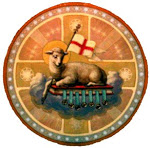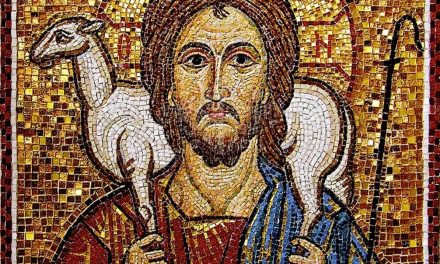Isaiah 49:3,5-6
Psalm 40
I Corinthians 1:1-3
John 1:29-34
The irreducible historicity of the Christian faith is on display in this week’s lectionary readings. They are all about the particular way in which the God of the universe has made himself known in human history, and how He has chosen to establish a link with creation which ultimately surpasses creation.
It is the “suffering servant” of Isaiah who speaks in the first reading, that enigmatic figure which appears in the prophetic imagination in response to the deeply traumatic events surrounding the Babylonian exile. The people of Israel have suffered greatly at the hands of their enemies, and suffer all the more because of their enduring belief that the God of all creation had chosen them from out of the nations to be His “cherished possession,” the bearer of his glory in the world.
In many ways the suffering servant is merely carrying on the perennial conversation between Israel and her God, in which the prophets interrogate God as to His steadfastness and goodness. It is the dialogue opened up by the recognition that a truly all-encompassing God could not be simply a part of the world or the product of human culture. The God of Israel initiated the dialogue, and ever since Israel has been constantly struggling to differentiate His true voice from the many voices of divinity manufactured by the human imagination. She is the one “contends with God,” who struggles to remain open to an ultimate meaning that comes from outside herself.
Surely the God who called Israel out from the nations and chose her to be His own would not be the sort of God who would allow her to suffer at the hands of her enemies. Yet Isaiah presents the servant of Yahweh as the one who reveals the true meaning of the people’s suffering by willingly accepting it as his own. It is through this servant that the Lord will show His glory by overcoming the people’s infidelity. Through the acceptance of this suffering by the beloved servant, not only will the people be reconciled to Yahweh, but the tribes of Israel will be gathered together as one.
It is true both as a general principle of Biblical history as well as particular principle of the moral life that the immediate effect of sin is alienation and fragmentation. Sin divides, obscures and distances us from one another. That is not an extrinsic penalty of sin, but rather sin’s essential definition. Conversely, it is a mark of the holy to unite, clarify and bind. The ultimate intention of God for His creation is not so much submission and conformity but harmonious solidarity.
It is through Israel that God has chosen to restore this solidarity—a solidarity which extends beyond the self-contained economies of family, nation and race to reestablish humanity’s intimate communion with God. “It is too little, the Lord says, for you to be servant, to raise up the tribes of Jacob, and restore the survivors of Israel; I will make you a light to the nations, that my salvation may reach to the ends of the earth.”
It is somewhat tempting to regard the phrase “light to the nations” as a kind of gnostic revelation which need no longer bother with historical contingencies once the saving mysteries have been unveiled. It took a community to bring about this light, perhaps, but once it has been transmitted surely all we need is the message! Yet the readings for this week make clear that the communion God intends is not meant to be simply a transcendental event taking place within the realm of human consciousness.
True, the Psalm tells us that God no longer desires holocausts and sin-offerings. What He wants is in fact much more alarming and dangerous: He wants us. He wants us to sing to Him, to say “behold, I come.” He wants our hearts to merge with His own, so that we may delight in what He delights in and be undone by what undoes Him. But how does this happen, if not through the contact between human persons in human communities within time and space?
The preface to St. Paul’s letter to the Corinthians is a prosaic reminder of the gritty historical medium through which God’s plan of redemption plays out. It is a letter, a message, written from a Jewish scribe to a bunch of Greeks in the middle of the first century. Yet as the liturgy reminds us each week, it is nonetheless “the Word of the Lord.” Imagine a long email being proclaimed two thousand years hence “the Word of the Lord”—how could such a quotidian text constitute divine revelation?
St. Paul’s letter is “God’s word” not merely on account of the theological concepts and moral dictums it contains, but more fundamentally because it displays the way in which the light and life bestowed upon the world by Jesus Christ is transmitted through the contact and communion between human persons. Paul has been called by Jesus Christ to be holy—set apart—and now he calls others in the same way so that they may establish a communion with one another through the common acknowledgement of Jesus’ universal Lordship over the world and human history.
It is the life of God himself, made incarnate in Jesus Christ, that takes hold within these communities founded by St. Paul. This is true evangelism at work: not only the transmission of ideas and techniques, but the establishment of an entirely new way of being human: a new kingdom, a new world.
In a sense, it is John the Baptist who formally initiates this process of communal renewal. Like Isaiah, he is looking not only for the coming messianic shepherd who will lead the people, gather them together and care for them. He is first and foremost looking for the “Lamb of God,” the one who will suffer and sacrifice himself for the people.
Christopher Hitchens once quipped that Christians seem blind to the fact that the shepherds’ ultimate aim in tending their sheep is to consume them. As sheep, why should we trust a shepherd? He obviously did not grasp—or did not sufficiently appreciate—the revolutionary way in which Christ proclaims himself “the good shepherd” in John’s gospel. Even before He is shepherd, the Baptist proclaims Him to be the “Lamb,” and even as shepherd what makes him good is that He “lays down his life for the sheep.”
The “taming” of humanity through the grace of the cross is not the restoration of an exploitative status quo; it is the reestablishment of a communion of love. The chosen One is the servant of all, the king is the one who suffers, and it is the Lamb who will lead us and be our shepherd.




